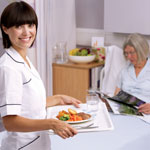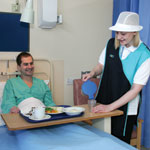Healthcare catering: Problems of perception
Stringent nutritional standards, decreasing NHS budgets and increasingly discerning patient tastes mean hospital contract caterers are under more pressure than ever. Elly Earls finds out how the sector is working to change the perception, and delivery, of hospital food
Hospital food has come a long way in the past decade, particularly in terms of the choice available to patients. Yet perceptions of patient feeding continue to fall below the ideal. "The press is still keen to print negative news stories and you rarely hear about the positive initiatives that are happening to offer patients nutritious, appetising meals," says Rosemarie Hoyle, divisional manager, healthcare, at Apetito.
Andrew Pickup, business excellence director for Medirest, part of Compass Group UK & Ireland, agrees. "Perceptions continue to be mixed. We are really proud of the quality of food we provide but recognise that, more broadly, some of the negative perceptions won't change until patients are consistently receiving good hospital food across the country."
Yet the general population's perception of hospital feeding is by no means the biggest challenge facing contract caterers. Indeed, according to Janice Gillan, chair of the Hospital Caterers Association (HCA), patient satisfaction surveys show that the majority of patients have few complaints. "It's not so much about the food being provided," she believes. "It's about how it's served at ward level."
This is a view shared across the industry, largely because, in contrast to any other catering operation, it is rare that the contractor is able to deliver the finished dish directly to the patient. "Most services only deliver to the ward; a ward hostess then delivers the food to the patient," explains Mark Nelson, catering director of OCS. "That's where the two sometimes aren't joined up; there is certainly room for improvement in that area."
According to Hoyle, it can sometimes take an hour or more for food to travel from the kitchen to the ward. "This means that by the time it reaches the patient, the food isn't appetising and is often at an incorrect temperature," she says.
Working closely with in-house operators is, therefore, absolutely crucial to ensuring that the food that eventually reaches the patient is of as high a quality as it possibly can be. Unfortunately, this is easier said than done.
"There is so much pressure on nurses to get beds freed up because they don't know how many admissions they will get in each night," Gillan explains. "So what's more important for them - trying to get the patients moved on or trying to feed them?"
On top of this, busy doctors are sometimes only able to visit patients during meal times which, again, can delay the delivery of piping hot food to many hospital residents.
"Catering is not seen as a frontline service," Gillan adds. "It's seen as a soft service, and it's therefore an easy target to remove money from. In areas where the caterer delivers the food right through to the end, hospitals have a much better service. But we cannot all afford that because we're getting money removed from our budgets year on year."
There are, however, solutions in the pipeline to give food the level of priority it deserves. In 2004, the HCA launched the Protected Meal Times initiative, which advocates that during meal times there should be no ward rounds or patient transfers and that patients should be allowed to eat their meal for 20 minutes in peace.
"We're looking to lobby MPs to raise awareness of this initiative and its benefits," Gillan says. "If we could do that, we'd really be raising the priority of food at ward level."
For Nelson, however, this will only be effective if the HCA appoints a more heavyweight spokesperson. "At the recent HCA meeting, this was one of the main action points," he says. "The voice of the caterers needs to have a bigger input; the HCA needs to be lobbying the government, a bit like the British Hospitality Association does."
In the meantime, contract caterers are getting round the issue with various innovative solutions. Apetito, for example, whose patient surveys regularly show that 80% of those receiving meals at the hospitals the company works with are very happy with their food, has a frozen-plated meal system. This means that meals can be regenerated at ward level, ensuring that patients are served a hot meal immediately.
Moreover, Compass Group has introduced Steamplicity, a cooking system that uses the water content naturally found in fresh food to steam-cook meals from fresh in just a few minutes. "Due to its cooking speed, patients are able to choose their dish only a few hours before they eat it, rather than a day or more in advance," says Pickup. "It also means that patients who are away from their beds during meal times can simply request their meal when back in bed and receive it minutes later."
While solutions such as these are designed to reduce wastage and, therefore, costs, as well as improving quality and choice, the NHS's all-encompassing focus on cost-cutting has meant that another option - standardisation - also came under discussion at the recent HCA meeting.
For many in the industry, the introduction of a national menu is a great idea - in theory. "It would dramatically increase consistency in terms of quality and nutrition and should also reduce the cost per patient per day," says Phil Hall, director, Sodexo Healthcare.
But only if it is done properly, Nelson stresses. "There's nothing wrong with the theory of standardisation, but you need to standardise and buy the right quality food, not standardise and buy the cheapest thing," he says.
Standardisation also brings with it a whole host of additional challenges. "The main issues would include the facilities available at each hospital and the concerns of local dietitians and nutritionists who often require bespoke menus for patients with specialist healthcare needs," Hall adds.
Caterers also must take into consideration the variations in patient tastes and preferences they encounter at different hospitals across the country. Perhaps most importantly, standardisation would have little impact on the quality of the physical delivery of food to patients.
There is no quick fix for either the poor perception of hospital food or the way in which it is delivered. While contract caterers are making the best of the current situation by implementing innovative solutions across the country, only time will tell whether more can be done to lobby the government into enforcing substantial, nationwide change.
The HCA will be meeting on 12 April to discuss these issues further and the HCA Conference, on 26 to 27 April, includes a session dedicated to debating the pros and cons of a national menu for NHS hospitals.
Frozen-plated meals: apetito at St George's Hospital, Tooting
According to Pat Taylor, dietitian for contract caterer Mitie, which has been using the CarteChoix range at St George's Hospital in Tooting, the system has increased the hospital's flexibility to deliver a responsive meal service that meets the nutritional needs of different patient groups.
"For example, we have introduced the plated option on a maternity unit where the patient numbers are very flexible and the staff rarely know who is eating until just prior to service," Taylor says.
"The new mums are offered an à la carte menu from which they make their choice, the hostess takes the meal from the ward freezer, cooks it and it is served to the patient. This enables the patient to make their own meal choice at the time they can, or want to, eat a meal."
For Rosemarie Hoyle, divisional manager, healthcare, at Apetito, the ability to order closer to mealtimes and get the food you have ordered can vastly reduce wastage and enhance rates of recovery.
"It has the potential to reduce food wastage on short-stay wards by as much as 30% and is well suited to wards with a high patient turnaround such as maternity, admissions and oncology, where flexibility is vital," she says.
Improving the patient experience: OCS at the Royal Free Hospital, Hampstead
Not only does the contract caterer work extremely closely with the dietetics team to provide ad hoc meals for patients with special dietary requirements, OCS, in collaboration with local Jewish charity Bikur Cholim D'Satmar Trust, also provides kosher food, including Shabbos meals, for the large Jewish population which uses the hospital.
"We do a lot of work on the patient experience," says OCS's regional account director Ian Surtees. "We have very stringent processes, procedures and KPIs [key performance indicators] in place to ensure we deliver on time and that everything is correct and hot."
To ensure that every meal that arrives in front of a patient is piping hot, all of the company's electronic trolleys have remote access, performance monitoring systems. "We can see remotely when the doors have been opened and what the temperatures of the trolleys are," Surtees explains.
Looking to the future, Surtees sees no reason to stop innovating. "This year we're developing pictorial menus for people with poor vision as well as Braille menus and joint language menus," he adds. "We're also working on using text messaging to give us instant patient feedback and exploring how to best use social media."












